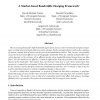Free Online Productivity Tools
i2Speak
i2Symbol
i2OCR
iTex2Img
iWeb2Print
iWeb2Shot
i2Type
iPdf2Split
iPdf2Merge
i2Bopomofo
i2Arabic
i2Style
i2Image
i2PDF
iLatex2Rtf
Sci2ools
124
click to vote
TOIT
2010
2010
A market-based bandwidth charging framework
The increasing demand for high-bandwidth applications such as video-on-demand and grid computing is reviving interest in bandwidth reservation schemes. Earlier attempts did not catch on for a number of reasons, notably lack of interest on the part of the bandwidth providers. This, in turn, was partially caused by the lack of an efficient way of charging for bandwidth. Thus, the viability of bandwidth reservation depends on the existence of an efficient market where bandwidth-related transactions can take place. For this market to be effective, it must be efficient for both the provider (seller) and the user (buyer) of the bandwidth. This implies that: (a) the buyer must have a wide choice of providers that operate in a competitive environment, (b) the seller must be assured that a QoS transaction will be paid by the customer, and (c) the QoS transaction establishment must have low overheads so that it may be used by individual customers without a significant burden to the provider...
Related Content
| Added | 31 Jan 2011 |
| Updated | 31 Jan 2011 |
| Type | Journal |
| Year | 2010 |
| Where | TOIT |
| Authors | David Michael Turner, Vassilis Prevelakis, Angelos D. Keromytis |
Comments (0)

